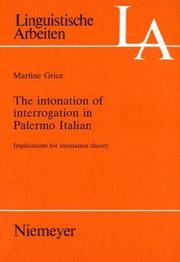| Listing 1 - 4 of 4 |
Sort by
|

ISBN: 3484303344 Year: 1995 Volume: 334 Publisher: Tübingen Max Niemeyer Verlag
Abstract | Keywords | Export | Availability | Bookmark
 Loading...
Loading...Choose an application
- Reference Manager
- EndNote
- RefWorks (Direct export to RefWorks)
Italian language --- Palermo (Sicily: City) --- Intonation --- Interrogative
Book
ISBN: 3110932458 9783110932454 Year: 2017 Publisher: Berlin Boston
Abstract | Keywords | Export | Availability | Bookmark
 Loading...
Loading...Choose an application
- Reference Manager
- EndNote
- RefWorks (Direct export to RefWorks)
In Palermo Italian yes-no interrogatives, if the last syllable of a phrase is unstressed, the nuclear pitch contour is rising-falling, whereas if it is stressed, the contour is simply rising. Such context-dependent variation cannot be adequately accounted for within a British-style approach to intonation. By contrast, autosegmental pitch accent studies of intonation, where nuclear pitch configurations are expressed in terms of H(igh) and L(ow) tones, are shown to offer the flexibility necessary to do so. These tones are incorporated into a hierarchical structure in which they have either an accentual or a primarily delimitative function. In the former case, tones are part of a Pitch Accent which has an association to a syllable; in the latter case, tones are associated to nodes representing higher prosodic constituents, either the intermediate phrase or the intonation phrase, and are realised as boundary tones. Building on current analyses, a model is proposed in which tones in the Pitch Accent are also hierarchically structured, involving two levels: the Supertone and Tone. This extended Pitch Accent structure not only explains apparent inconsistencies in phonetic alignment in Palermo Italian, but also accounts for equivalent consistency in alignment in English. In addition it allows leading tones in Palermo Italian to be treated in a qualitatively different way from leading tones in English. The Palermo Italian interrogative marker consists of a L*+H Pitch Accent. There is no paradigmatic contrast on the intermediate phrase boundary tone (it is always L) which means that its function is purely delimitative. This tone is only fully realised when a postaccentual syllable is available to carry it; technically, it requires a secondary attachment to a syllable. The absence of the falling part of the L*+HL (L) configuration in phrases with no postaccentual syllable is thus explained.
Italian language --- Sicilian language. --- Intonation. --- Calabro-Sicilian language --- Sicilianu language --- Siculu language --- Romance languages --- Dialects. --- Dialects
Book

ISBN: 9783110198751 Year: 2008 Publisher: Berlin Boston
Abstract | Keywords | Export | Availability | Bookmark
 Loading...
Loading...Choose an application
- Reference Manager
- EndNote
- RefWorks (Direct export to RefWorks)
Book

ISBN: 9781614510772 Year: 2012 Publisher: Berlin Boston
Abstract | Keywords | Export | Availability | Bookmark
 Loading...
Loading...Choose an application
- Reference Manager
- EndNote
- RefWorks (Direct export to RefWorks)
| Listing 1 - 4 of 4 |
Sort by
|

 Search
Search Feedback
Feedback About UniCat
About UniCat  Help
Help News
News